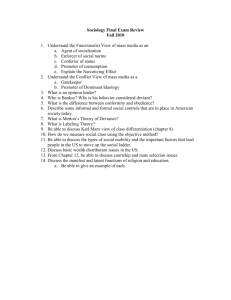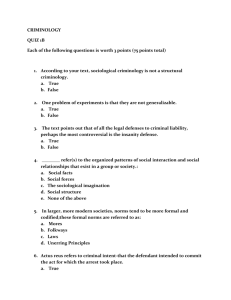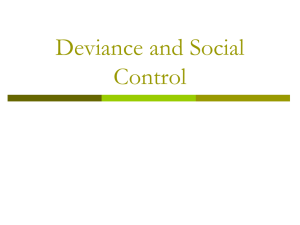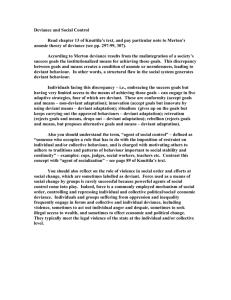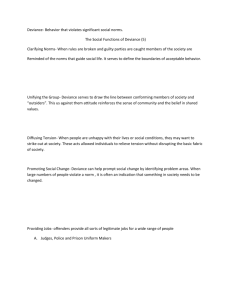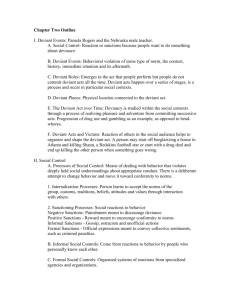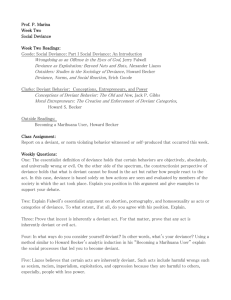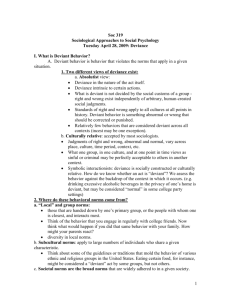Action Research Deviant Behavior At School Definition “Deviant
advertisement
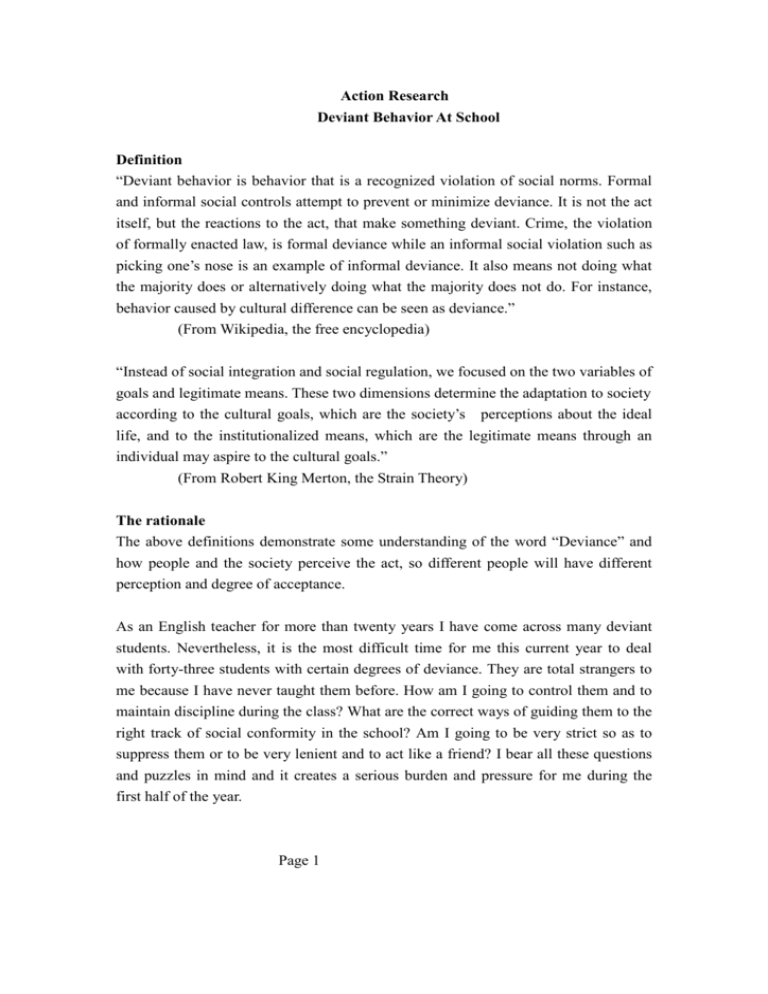
Action Research Deviant Behavior At School Definition “Deviant behavior is behavior that is a recognized violation of social norms. Formal and informal social controls attempt to prevent or minimize deviance. It is not the act itself, but the reactions to the act, that make something deviant. Crime, the violation of formally enacted law, is formal deviance while an informal social violation such as picking one’s nose is an example of informal deviance. It also means not doing what the majority does or alternatively doing what the majority does not do. For instance, behavior caused by cultural difference can be seen as deviance.” (From Wikipedia, the free encyclopedia) “Instead of social integration and social regulation, we focused on the two variables of goals and legitimate means. These two dimensions determine the adaptation to society according to the cultural goals, which are the society’s perceptions about the ideal life, and to the institutionalized means, which are the legitimate means through an individual may aspire to the cultural goals.” (From Robert King Merton, the Strain Theory) The rationale The above definitions demonstrate some understanding of the word “Deviance” and how people and the society perceive the act, so different people will have different perception and degree of acceptance. As an English teacher for more than twenty years I have come across many deviant students. Nevertheless, it is the most difficult time for me this current year to deal with forty-three students with certain degrees of deviance. They are total strangers to me because I have never taught them before. How am I going to control them and to maintain discipline during the class? What are the correct ways of guiding them to the right track of social conformity in the school? Am I going to be very strict so as to suppress them or to be very lenient and to act like a friend? I bear all these questions and puzzles in mind and it creates a serious burden and pressure for me during the first half of the year. Page 1 In order to teach in the most effective way and to have harmony with them I try not to be strict at the beginning and in the hope of maintaining good relationship with them. However, to my disappointment, most of them will not obey you. They are used to strict discipline in their junior forms. Therefore, I have to reconsider my ways of managing them. I think the most important thing is to get to know them and understand their family background, their character, their history at school and the peer group influence. There is no way to help them if you do not understand the cause of their deviance. They do not mean to disrespect the teacher on purpose but it is their way of responding to things. I plan to do this research for the sake of releasing my stress and dismay because I believe that there must be a cause of their deviance so why am I taking it so seriously and be unhappy? Planning The target group is class Form 4D. Most of the students come from the C, D and E classes of Form 3 and they are considered as the less able students in the form. They are usually very rude with frequent coarse language and violent behavior. Most of them do not have an intention to learn. They are used to arguing with the teacher and deny what they have done wrong. Bullying is common in the class so many of the better students will keep quiet and dare not argue with the big brothers or sisters in order to avoid trouble. I select six typical deviant students first from the class and start interviewing their parents and talk to them individually. In order to respect their privacy, I will not use their full name in any of the cases I mentioned here after. Class 4D Name of students Chan Kam Koo Lai Lo Yu Page 2 Process I phoned the parents whenever they have violated the school rules or show any disrespect to the teachers. The following is the information I get from their parents and the past teachers. I begin to understand the students more and gradually I sympathize some of them. The first student Chan is a very rude student who does not show any respect to the teachers or observe any school rules. He shouts out rudely whenever he likes. He denies anything that he has done wrong. When he walks along the corridor, he will call teachers by their nicknames and occasionally turns off all the lights and then switches them on again. He has a very weak foundation in all subjects. This is the impression I get from him at the beginning of the term. I tried to contact his parents and he became very scared and told me that he would be obedient and would not be naughty anymore. His mother said that she would talk to his father and punish him. His parents go to China very often and he will not have any body to take care of him so he will play with teenagers in the neighborhood. Some teachers said that he was more obedient when he was in the junior forms. When he is older he becomes more rebellious because of peer group influence and the hope of getting more attention from others. The second student Chung is in fact very simple-minded and absent-minded. He does not have any idea of what he is doing or learning. He will do anything as proposed by his mother. Everyday his Mum will pack the schoolbag and arrange everything for him. He will talk and play during the lesson without paying attention to the teacher. His Mum will phone to the teacher nearly everyday enquiring even very trivial matter and treat him like a primary student. Sometimes when he is very rebellious, she will be very upset and phone the teacher, asking the teacher to punish him. I talked to her, explaining that she should treat him as a teenager and let him be independent and should not solely rely on her. She must allow him to grow up. Maybe she is a single parent so she is too nervous about her son. The third student Koo is very boastful, impolite and arrogant. He does not respect anybody including his mother. He is clever but lazy. Moreover, he is too proud of himself and will not pay attention to any advice. Page 3 Once I talked to his mother and she told me that he was very rude at home as well. She was sometimes too angry with him that she refused to talk to him for a few weeks. His father spoilt him by giving him a lot of pocket money and he became very thrifty. Most teachers will assume that he is very annoying. The fourth student Lai is very notorious about her coarse language. She is frequently absent from school. The record is about 60 days in this current year. She talks loudly whenever she is at school and stares at the teacher if you ask her to keep quiet or observe the school rules. She acts like a big sister in the class and if anyone who does not agree with her will be scolded or shouted at. She is a very difficult student to manage. I talk to her mother and she told me that she did not live with her because she divorced her father a few years ago. There was nobody to look after her and she became so rebellious that she would not listen to anybody including her mother. She said sorry to me and asked me to talk to her father instead. I can hardly contact her father so I have to counsel the girl individually from time to time. The fifth student Lo is a frequent latecomer. The record is so high that you cannot believe it. The teachers are so annoyed with him because he is nearly late every alternate morning. He is so lazy that he will not do any of his homework until you order him for a detention and finish his work at school. I interviewed his mother and she was also very angry with him because it was very difficult to wake him up in the morning. He has four sisters and he is the youngest and the only son in the family. Everybody loves him and spoils him like the king of the family. Both parents have retired and the only work is to look after him. Every morning his father will prepare breakfast first and then ask him to wake up but he listens to nobody and refuses to do so. Once when I talked to his mother and she was so furious to tell me that he would lock his door in the morning and post up a notice outside the door. It was written, “Do not disturb. I am too tired to wake up and I am sick.” Page 4 The sixth student Yu has a very kind father who speaks very softly and politely to the teacher every time when his son gets into trouble or violates the school discipline. However the son is very fierce and scolds his father in front of the teacher. When I asked him to behave himself and should speak politely to his father, he would say that it was his business. All his brothers and sisters have finished school. He is the youngest and also the spoilt child in the family. Once I bought 43 lollipops to school before the school picnic and I put them on the desk. I went to the back to check the student’s uniform and he quickly grasp some of the lollipops in his pockets. By the time I distribute the lollipops to the class it was not enough. I was so angry at him and I nearly lost my temper. He is an absolute deviant and he is a good friend of Chan and Koo. Findings There are forty-three students in the class so there are forty-three different stories behind these students. I only bring out six cases but there are a lot more. Many of them have the following common symptoms: 1. The overall foundation is very weak or below average. 2. They are the spoilt child of the family and rely heavily on others. 3. They cannot make any decision and have no idea of what he/she is doing. 4. Peer group influence is a big problem and they do not know how to choose friends. 5. They often argue with the teachers and sometimes insult them to boost their confidence and attract attention. In fact, they do not have much achievement at school so they feel very inferior as compared with other students. 6. They do not have any goals or expectations for their future. 7. They do not have any social or moral values so they do not know how to respect people around them. 8. Family members do not set up good role models for them to follow because most of them have very low social status. They do not know the correct way to guide their children. 9. They have no interest in studying because they are considered as low-achievers and their foundation is too weak to catch up. Page 5 10. Laziness is a big hindrance in their overall development. 11. The family background makes a huge impact in their upbringing. 12. Labeling effect ever since they were young. They react to that label applied to them and they act more and more like the label. Eventually, in a self-fulfilling manner, they accept all of the labels. The follow up I was so frustrated during the first term of the year but when I gradually came to understand them more I realized that their family background has played an important role in their upbringing. I will talk to their parents more often and the child alone as well. We cannot blame the child and it is not all their fault. Sometimes I will be very strict because I have to keep the school discipline. However, I will spend more time to talk to them and let them realize the importance of observing school rules and be a decent and responsible person. They are no longer a child and they are senior form students at the moment. It is time to reconsider their behavior and think about their future and start working hard for the Public Examination. Once I was so angry about their violent behavior and I stood outside the corridor sobbing. Lai came out and asked me to go back to the classroom. The classroom was so quiet with dead silence at that moment. She said, “Miss Lau, I am sorry for what I have done. We are waiting for you.” There seems to be a kind of mutual understanding between me and the class as time goes by. The most important thing is to let them know you really care for them. I should act like a friend, a teacher as well as their Mum. There is a kind of trust developed during the last few months of the second term, but it is never too late. They know that the teacher cares about their future and would try every means to help them. They cannot correct all their misbehavior immediately because it is rooted deeply inside for quite a long time. At least they can distinguish what is good or bad and will apologize whenever they have done something wrong. Page 6 Reflection and evaluation The average students in our school are band 2 to band 3, so most likely, there will be a large number of deviant students. When we first meet them, we may feel disappointed or shocked by their misbehavior. However, if you can understand them more you will find a way to help them and develop a more harmonious relationship with them. There is a story behind every student and some of them desperately need our care and love because nobody will understand them more than the teacher. Labeling is giving a lot of pressure to the deviant students. Therefore, compliment and encouragement is more effective than scolding or punishment. Try to be generous and praise them whenever needed. I am not saying that we have to be very lenient and never punish them for what they have done wrong. We have to judge what the most appropriate way is to deal with a particular student. Moreover, mutual respect and friendliness is very important to gain a student’s trust and love. Although I have a very hard time in dealing with the students in form 4D, I get an alternative experience of dealing with students which will be very useful for me in the future. As a conclusion, I will be more mature in handling deviant behavior at school and I will look at students from different sides and angles. It is fairer to them as they are the future master of the society. Planned and Designed by Lau Po Lin Catherine 9th July, 2007. Page 7
